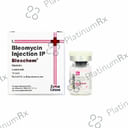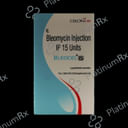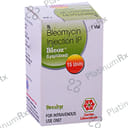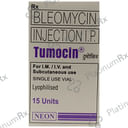Bleomycin
Uses
Bleomycin is used in the treatment of cervical cancer, cancer of the mouth, nasopharynx and paranasal sinuses, larynx, esophagus, and skin cancer.
How it Works
How Bleomycin Works Bleomycin is an anti-cancer medication. It functions by damaging the genetic material (DNA) of cancer cells, thereby inhibiting their growth and multiplication.
Side Effects
Common side effects of Bleomycin include fever, hair loss, stomatitis (inflammation of the mouth), vomiting, weight loss, bleeding, chills, decreased appetite, erythema (skin redness), nail disorders, rash, ulcers, skin hyperpigmentation, skin thickening, hyperkeratosis, vesiculation, tenderness, itching, hyperesthesia (increased sensitivity), skin peeling, and stretch marks.
Expert Advice
- Bleomycin is administered as an injection into the veins, muscles, or under the skin by a healthcare provider.
- Do not skip any doses and complete the course as directed by your doctor.
- Use an effective method of birth control to prevent pregnancy while taking this medication.
- You may need to undergo blood tests to monitor your blood cells, liver function, and kidney function during treatment.
- Inform your doctor immediately if you experience coughing, shortness of breath, or a cracking sound while breathing.
Related Medications
Bleomycin 15IU

₹681.6
Bleomycin 15IU

₹1,260
Bleomycin 15IU

₹1,039.3
Bleomycin 30mg

MRP ₹837
Bleomycin 15IU
₹681.6
Bleomycin 30mg

₹248.6
Bleomycin 15IU

₹612.5
Bleomycin 15IU

₹800
Bleomycin 15IU

₹591.4
Bleomycin 15IU

₹654.8
Bleomycin 15IU

₹717.2
Bleomycin 15IU

₹666.6
Bleomycin 15IU

₹640
Bleomycin 15IU

₹591.4
Bleomycin 15mg

₹985
Bleomycin 15IU

₹650
Bleomycin 15mg

₹950
Bleomycin 15IU

₹889
Bleomycin 15mg

₹995
Bleomycin 15IU

₹850
Bleomycin 15IU

₹637
Bleomycin 30mg

₹1,545
Bleomycin 15000IU

₹646
Bleomycin 15IU

₹506
Bleomycin 15IU

₹925
Flat ₹100 off on first app order | Use Code: APP100 |
Flat ₹100 off on first app order
USE CODE: APP100

Download Now